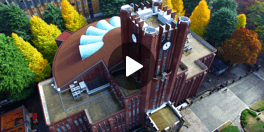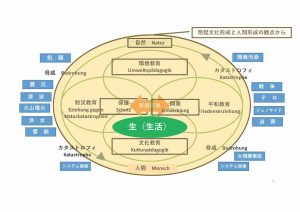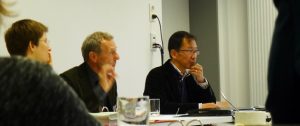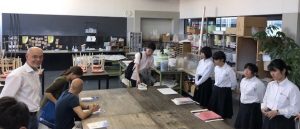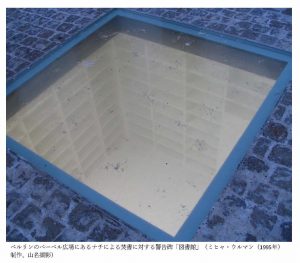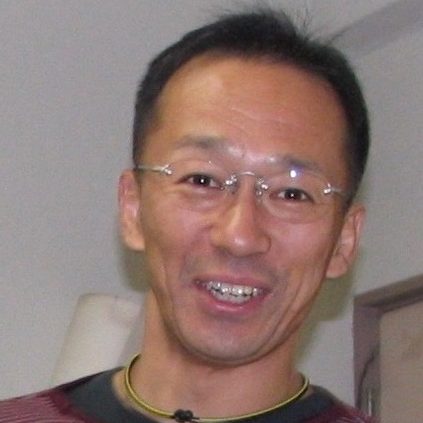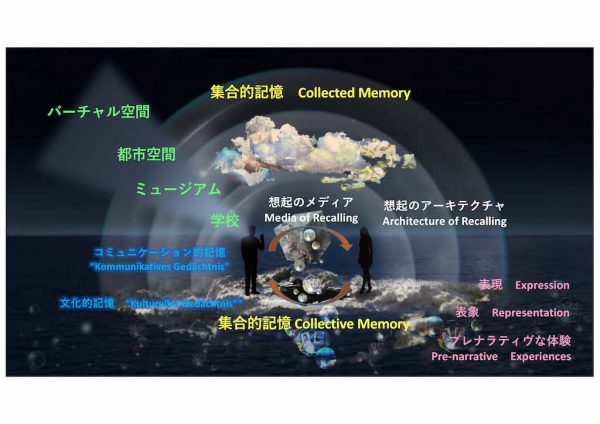
May 17, 2021
【研究紹介】メモリー・ペダゴジー構想とカタストロフィ(山名淳教授)The Concept of Memory Pedagogy and Catastrophes (Prof. YAMANA Jun)
カタストロフィの教育学 人間の生(生活)と文化をその根底から脅かすような事態(カタストロフィ)の記憶を伝えるために、教育はどのような可能性を有しているのでしょうか。そのような関心から教育を捉え直すことに関心をもつようになった切っ掛けは、一九九〇年代におけるベルリン・フンボルト大学への留学およびその後の日独共同研究を通してドイツの「追悼施設教育学(Gedenkstättenpädagogik)」というジャンルに出会ったことでした。「追悼施設教育学」は、ナチズムの記憶と折り合おうとする教育の理論と実践の総称です。そこを起点として、次第に〈平和〉の対極状況(戦争や迫害、大規模事故やシステム破綻、自然災害、環境破壊など)の想起と想像に関与する教育に共通する課題について考えるようになりました。具体的には、広島の原爆投下に関する想起のアーキテクチャと人びとのコミュニケーション活動を考察対象にしてきました。
メモリー・ペダゴジー 『災害と厄災の記憶を伝える――教育は何ができるか』(矢野智司氏との編著、勁草書房、2017年)を出版して以降、記憶と想起の問題を教育の視点から論じる際の理論基盤を構築することにますます関心を寄せるようになりました。学際的かつ国際的なドイツのメモリー・スタディーズの拠点(Frankfurt Memory Studies Platform)ともコンタクトを取りつつ、このジャンルと教育学の接合を試みています(メモリー・ペダゴジー構想)。過去の想起を通して、現在の状況を解釈し、そこから未来の展望が開かれていくことを考察しようとするメモリー・ペダゴジーは、教育全般にわたる多様な想起の在り方への考察に繫がっていく可能性を有しています。
文化と人間の形成論 私の専門分野は、教育哲学・思想史です。修士論文ではカントの啓蒙論を検討し、博士論文ではドイツ田園教育舎という生活改革志向の教育施設の理論と実践の解釈を試みました。ゼミ生たちも、メモリー・ペダゴジーについてのみならず、多様なテーマに取り組んでおります。大学院の授業には、学際情報学府と教育学研究科の学生たちが集い、メディアやアーキテクチャを中心とした文化への関心と、人間とその変容への関心とが、相互によいかたちで化学反応を起こして刺激的な議論が展開されています。
Yamana, J. (2020), Catastrophe, commemoration and education: On the concept of memory pedagogy, Educational Philosophy and Theory, Vol. 52, Issue 13, pp.1375-1387.
https://doi.org/10.1080/00131857.2020.1773795
Yamana, J. (2020), Crossover between Memory Pedagogy and Research on History of Pedagogical Ideas on Catastrophes, Kato, M. (eds.), Philosophy of Education in a New Key: Voices from Japan (Educational Philosophy and Theory), pp.11-12.
https://doi.org/10.1080/00131857.2020.1802819
Yamana, J. (2019), Über-Setzung des kommunikativen und kulturellen Gedächtnisses: Zur Interpretation des pädagogischen Projektes „Gemälde der Atombombe“ in Hiroshima, Engel,N./Köngeter,S. (Hrsg.), Übersetzung: Über die Möglichkeit, Pädagogik anders zu denken., Springer Verlag, S.99-114
山名淳『都市とアーキテクチャの教育思想』勁草書房、2015年
記事:山名淳(教授)
英語校正:デービッド・ビュースト(特別専門員)
Pedagogy of Catastrophes: How can education handle negative memories of catastrophes, which totally threaten human lives and their cultures? I became interested in rethinking education from this perspective, when I encountered the German genre of “Gedenkstättenpädagogik” (pedagogy of memorial spaces and institutions) through my study at Humboldt University in Berlin in the 1990s and several Japanese-German colaborative research projects after that. “Gedenkstättenpädagogik” is a term for educational theories and practices that attempt to deal with the memory of Nazism. From that starting point, I gradually began to consider the issues common to education that involve recalling and imagining situations antithetical to “peace”, such as war, persecution, large-scale accidents, system failures, natural disasters, and environmental destruction. Specifically, I have been considering the architectures of recall and communicative activities related to the atom bombing in Hiroshima.
Memory Pedagogy: Since the publication of “Can Memory of Catastrophes Be Passed on to Others? Possibilities and Borders of Education”, (edited by Yamana and Satoji Yano, Keiso Shobo: Tokyo, 2017, in Japanese), I have become increasingly interested in developing a theoretical foundation for discussing issues of memory and recall from an educational perspective. While maintaining contact with an interdisciplinary and international German center for memory studies (Frankfurt Memory Studies Platform), I am trying to connect this genre with pedagogy (Memory Pedagogy Project). Memory Pedagogy seeks to interpret the present through the recall of the past, and to consider how the cycle of memories can open up a vision of the future. It has the potential to connect to new ways for considering education and human development.
Transformation of Culture and Human Beings (Bildungstheorie): My field of research is the philosophy of education and history of ideas about human beings and culture. My master’s thesis examined Kant’s theory of the Enlightenment. In my doctoral dissertation, I attempted to interpret the theory and practice of a life-reform-oriented educational institution called the “Deutsche Landerziehungsheime”. My seminar students are also working on a variety of topics, not only on memory pedagogy. My graduate classes bring together students from the Graduate School of Interdisciplinary Information Studies and the Graduate School of Education. I am glad that a good chemistry is arising through crossing between their interests in culture and human beings, creating the opportunity for stimulating discussions.
Recent publications (selected):
Yamana, J. (2020), Catastrophe, commemoration and education: On the concept of memory pedagogy, Educational Philosophy and Theory, Vol. 52, Issue 13, pp.1375-1387.
https://doi.org/10.1080/00131857.2020.1773795
Yamana, J. (2020), Crossover between Memory Pedagogy and Research on History of Pedagogical Ideas on Catastrophes, Kato, M. (eds.), Philosophy of Education in a New Key: Voices from Japan (Educational Philosophy and Theory), pp.11-12.
https://doi.org/10.1080/00131857.2020.1802819
Yamana, J. (2019), Über-Setzung des kommunikativen und kulturellen Gedächtnisses: Zur Interpretation des pädagogischen Projektes „Gemälde der Atombombe“ in Hiroshima, Engel,N./Köngeter,S. (Hrsg.), Übersetzung: Über die Möglichkeit, Pädagogik anders zu denken., Springer Verlag, S.99-114
山名淳『都市とアーキテクチャの教育思想』勁草書房、2015年
Text:Jun Yamana (Professor)
English proofreading:David Buist (Senior project specialist)
主担当教員Associated Faculty Members
教授
山名 淳
- 文化・人間情報学コース
Professor
YAMANA, Jun
- Cultural and human information studies course

